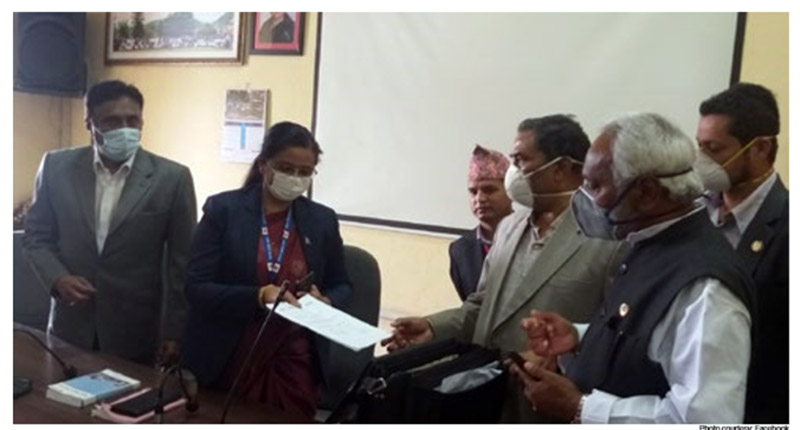RJP-N, SP-N unify, register new party at EC
- Poll panel to decide by tomorrow
- New ordinance proves to be a catalyst for unification
Kathmandu, April 23
Fearing split, the Samajwadi Party-Nepal and Rastriya Janata Party-Nepal sealed a unity deal late last night and leaders of the two parties went to the Election Commission to register their new party — Janata Samajwadi Party-Nepal — early this morning.
The EC has registered the new party’s application and will take a decision on its registration after the new party submits documents required to get the poll panel’s recognition.
The unity averted the risk of a split in the SP-N as Vice-chair of the party Renu Yadav was allegedly preparing to split the party with the support of six other party lawmakers – Mohammad Ishtiyak Rayi, Uma Shankar Argariya, Pradip Kumar Yadav, Surendra Yadav, Kaludevi Bishwakarma and Renuka Gurung.
Lawmaker Pradip Kumar Yadav and Ishtiyak Rai admitted that they had grudges against the party leadership but were not preparing to split the party.
“News reports that seven lawmakers of the party, including me, were preparing to split the party are not true. I have grievances with the party leadership. Some of our party lawmakers think that the party leadership is not treating us fairly. We are elected representatives and the party leadership needs to treat us fairly. We will continue to fight for our cause within the party,” said Pradip Kumar Yadav.
Ishtiyak Rayi said the report that he was siding with other party dissidents to split the party was false. “We have dissatisfaction with the party leadership but that does not mean we want to split the party,” he said. He added that he was at his residence last night and not at Marriott Hotel, Naxal.
“All political parties have some members who have grievances with the leadership. I also have my grievances with the party leadership, but that does not mean that I am for splitting the party,” he added.
Spokesperson for the Election Commission Raj Kumar Shrestha said the two parties told the poll panel about their agreement to unify their parties and were supposed to submit necessary documents at the EC within the next 45 days. According to Shrestha, the two parties were required to give their respective central committees’ decision to unify their parties, draft statute of the unified party and submit names of the office bearers of the unified party, along with photocopies of the citizenship certificates of the unified party’s office bearers and documents showing that the two parties were registered at the EC before. “Once the EC gets all the required documents from the party, office bearers of the poll panel will scrutinise the application and register the party if they deem it right,” Shrestha added.
The ordinance that amended the provisions of the Political Party Act allowing party dissidents to split their party with the support of 40 per cent members of the central committee or the parliamentary party has boomeranged on the government that brought the ordinance mainly to facilitate splits within the SP-N and the RJP-N as it hastened the unity of the two forces that want amendment to the constitution. The SP-N and the RJP-N had held several rounds of negotiation in the past but had not been able to iron out certain differences, but this time they feared that the provisions of the ordinance could tempt their party dissidents to split their parties and hastened to seal a unity deal.
Janata Samajwadi Party-Nepal leader Rajendra Mahato said they signed the unity deal to give befitting reply to Prime Minister KP Sharma Oli who relaxed the provision of the Political Party Law to engineer splits in the SP-N and RJP-N. “With this deal, we have given the message that we are not divided but united. We were to seal a unity deal after the lockdown but since the government brought the ordinances, we hastened to seal the deal of unity,” he added.
Constitutional expert Chandra Kanta Gyawali said the chances that the SP-N dissidents would split the unified party were slim as the two parties had filed application seeking registration of the new party at the EC. Had party dissidents registered their application at the EC before the SP-N and RJP-N submitted application for registration at the EC, the poll panel could give validity to the former’s application, but now there was no such possibility.
Pact in nutshell
- The unity agreement sealed by the SP-N and RJP-N states that they are unifying their outfits as it is necessary to create a political movement to achieve the goals of socialism, identity-based federalism by rallying the support of people in mountains, hills and the Tarai
- The two parties also urged all communities, including Madhesis, Muslims, indigenous nationalities, Dalits and women to join hands to create an alternative force in the country
- The agreement adds that the political system should be reformed to achieve the goals of identity-based federalism, inclusive and participatory democracy, socialism suitable for multi-nation states, social justice, prosperity and nationalism based on multi-culturalism
- The democratic federal republican system that was established as a result of sacrifices of countless people and seven-decade long crusade is far from perfect, but this system is certainly the most important achievement that the people of Nepal have achieved thus far, the two parties said in their unity agreement
- Four leaders from both the SP-N and RJP-N signed the unity deal. Those who signed the deal include Mahantha Thakur, Rajendra Mahato, Mahendra Ray and Sharat Singh Bhandari from the RJP-N and Baburam Bhattarai, Upendra Yadav, Ashok Rai and Rajendra Shrestha from the SP-N. Both the SP-N and RJP-N have 17 lawmakers each in the House of Representatives
A version of this article appears in e-paper on April 24, 2020 of The Himalayan Times.






